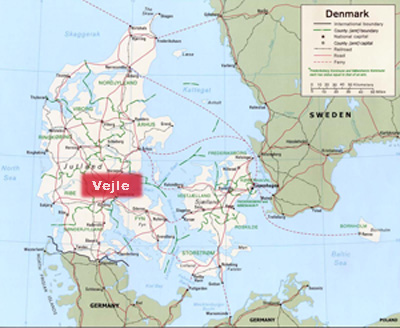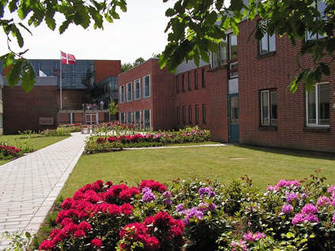The Kingdom of Denmark (pop. 5.5 million) is a constitutional monarchy and sovereign state comprising the country of Denmark in northern Europe and two autonomous constituent countries, the Faroe Islands and Greenland in the North Atlantic.
Vejle (pop. 50,000) lies in the southeast of the Jutland peninsula at the head of Vejle Fjord, where the Vejle and Grejs Rivers and their valleys converge, in southern Denmark. Vejle is serviced by Denmark's second-largest airport, Billund Airport, located some 30 km from downtown Vejle. Airport buses run regularly to Billund Airport from Vejle Transit Centre. Vejle is most known for its forested hills, fjord, harbour, shopping, pedestrian mall, and iconic windmill. During the Middle Ages, Vejle was important as a market town, and developed along those lines up to the mid-17th century, trading with cities such as Lübeck and Flensburg, in what is now Germany. In the late 17th and early 18th centuries, Vejle's population was diminished as a consequence of plague and war. In 1796, though, Vejle was made the seat of the newly founded Vejle County, and the town expanded throughout the 19th century, benefiting from improvements such as a new harbour on the fjord, a railroad station, and modern utilities. From the mid-19th century into the 20th century, Vejle developed from a provincial market town into a busy industrial centre, eventually becoming known as the 'Manchester of Denmark' for its many cotton mills. Today, Vejle is a cultural and economic centre. It is rich in industry, business, and the service sector. Industry has always been very important for the city's development, while today more weight is placed on business and service, as well as high-tech firms.
Vejle is known regionally as a vibrant shopping town with a wide and varied offering of both chain and specialty shops, primarily located along the city's central pedestrian mall. Vejle's oldest extant building, St. Nicolai Church, was built in the mid-13th century. On display in the church is the Haraldskær bog woman, a body from the Iron Age that was preserved with its skin intact in a local peat bog. Another feature of the church are 23 spherical indentations on the north transept – legend says these are imprints of the skulls of executed robbers from the Vejle area. Museums include the Vejle Art Museum, with some Rembrandt pieces, and the Vejle City Museum, located in a renovated cotton mill. Vejle also is situated close to several Jutland attractions such as the original Legoland, and the Viking Age royal capital of Jelling. Jelling's archaeological artifacts are a UNESCO World Heritage Site, and include two 10th century rune stones and two burial mounds, as well as a new exhibition centre. The original Legoland park, opened in 1968 in Billund. The Park is located next to the original Lego factory and Denmark's second busiest airport Billund Airport. 1.6 million guests visited the park in 2007 and over the years more than 40 million guests have been through the park. This makes it the largest tourist attraction in Denmark outside of Copenhagen. The Legoland parks that have since been built are modelled upon Legoland Billund, most noticeably the Miniland area, which serves as the heart of the park.
|
|||||||||||||||||||||||||||||||



